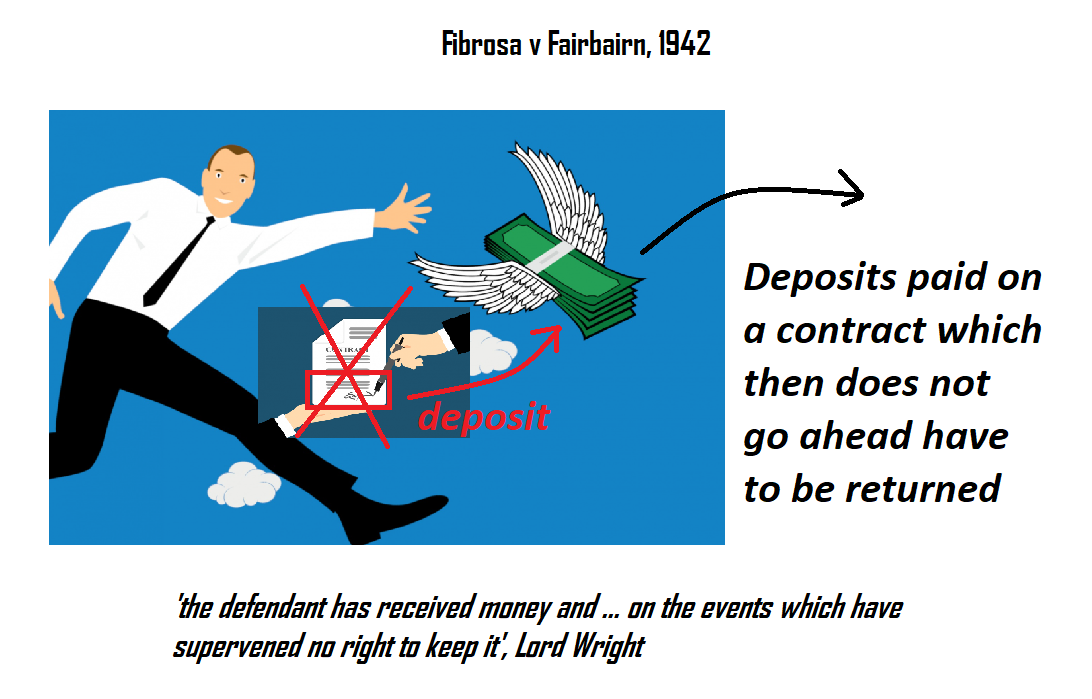Fibrosa Spolka Akcyjna v Fairbairn Lawson Combe Barbour Ltd [1942] UKHL 4
Citation:Fibrosa Spolka Akcyjna v Fairbairn Lawson Combe Barbour Ltd [1942] UKHL 4
Rule of thumb:If a deposit is given, then the contract does not go ahead, does this deposit have to be returned? The general answer is yes it does have to be returned - where someone is given a deposit on a contract that then does not go ahead, the party receiving this deposit has to return it on the grounds of unjustified enrichment. If not, then this has to be clearly explained and this provision contracted out of.
Background facts:
The facts of this case were that in 1939 Fibrosa agreed to purchase machinery from Fairbairn for £4,200. An advanced payment of £1,000 was made. The war then started and the contract was frustrated due to the outbreak of war.
Parties argued:
Fibrosa argued that they wanted the £1,000 back because Fairbairn had not started the project. Fairbairn argued that this was just a risk that they took, they had already spent negotiating and planning, and refused to pay this back.
Judgment:
The Court upheld the arguments of Fibrosa. Where a contract has become frustrated any sums paid under it must be returned if the money has not been used to start the work under the principle of unjustified enrichment.

Ratio-decidendi:
'The claim for money had and received always rested on a debt or obligation which the law implied or more accurately imposed, whether the procedure actually in vogue at any time was debt or account or case or indebitatus assumpsit. Even the fictitious assumpsit disappeared after the Act of 1852. I prefer Lord Sumner's explanation of the cause of action in Jones's case. This agrees with the words of Lord Atkin which I have just quoted, yet serious legal writers have seemed to say that these words of the great judge in Sinclair v Brougham closed the door to any theory of unjust enrichment in English law. I do not understand why or how. It would indeed be a reductio ad absurdum of the doctrine of precedents. In fact, the common law still employs the action for money had and received as a practical and useful, if not complete or ideally perfect, instrument to prevent unjust enrichment, aided by the various methods of technical equity which are also available, as they were found to be in Sinclair v Brougham. Must, then, the court stay its hand in what would otherwise appear to be an ordinary case for the repayment of money paid in advance on account of the purchase price under a contract for the sale of goods merely because the contract has become impossible of performance and the consideration has failed for that reason? The defendant has the plaintiff's money. There was no intention to enrich him in the events which happened. No doubt, when money is paid under a contract it can only be claimed back as for failure of consideration where the contract is terminated as to the future. Characteristic instances are where it is dissolved by frustration or impossibility or by the contract becoming abortive for any reason not involving fault on the part of the plaintiff where the consideration, if entire, has entirely failed, or where, if it is severable, it has entirely failed as to the severable residue, as in Rugg v Minett. The claim for repayment is not based on the contract which is dissolved on the frustration but on the fact that the defendant has received the money and has on the events which have supervened no right to keep it’, Lord Wright
'the defendant has received money and ... on the events which have supervened no right to keep it', Lord Wright, 155
Warning: This is not professional legal advice. This is not professional legal education advice. Please obtain professional guidance before embarking on any legal course of action. This is just an interpretation of a Judgment by persons of legal insight & varying levels of legal specialism, experience & expertise. Please read the Judgment yourself and form your own interpretation of it with professional assistance.

